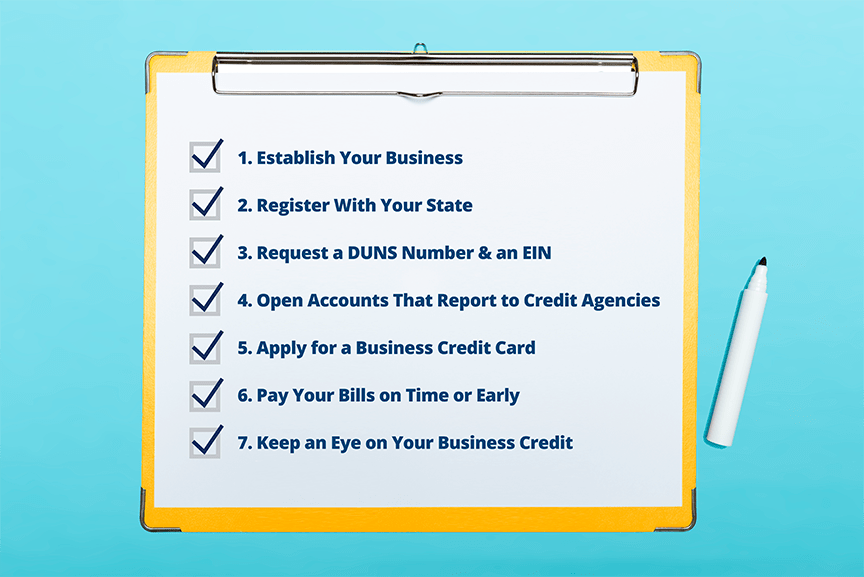How to Build Business Credit in 7 Steps
Get tips on building and monitoring business credit and understand why it’s important for your company.
When your business is just starting, your to-do list can seem endless, from paying business start-up costs to registering with your state. But the time and effort it takes to start a business is worth it to be your own boss and see the fruits of your labor pay off. Taking the time to check off the items on your list means you’re one step closer to success and future growth.
Reality check: What should actually be on your to-do list? One of the most important things to do for your business is to establish business credit. A good business credit score can help you score big contracts, establish partnerships with vendors and suppliers, and secure financing. But a poor credit score (or no credit score) can do just the opposite.
Don’t panic — we’re here to help. Read on for our complete guide on the importance of business credit, building business credit, and monitoring your score.

-->
Why Is Having Good Business Credit Important?
When you’re applying for financing for your small business, your personal and business credit scores are the main factors determining whether your loan application is accepted. Having a good business credit score may help you qualify for better financing terms and lower interest rates — both great things. Anyone can check your business credit, so other companies may review your score before deciding whether to do business with you. You want to ensure you look your best to get those lucrative contracts.
On the flip side, a poor score may cause you to lose out on a loan, and can increase your insurance rates and even impact potential partnerships with suppliers, vendors, and customers.
Does Your Personal Credit Score Matter for Your Business?
It’s a common misconception that if your business credit score is strong, lenders won’t check your personal credit score. You may have already completed some of them for your business. If that’s the case, pat yourself on the back and move on to the next step.
If your personal credit score needs some work, don’t worry. You can still start to establish business credit even without strong personal credit, and there are even options for getting business loans with bad credit. What does this mean for you? Well, more options, of course.

What are the Steps to Building Business Credit?
Before you open those sleek new credit cards, read through the steps you’ll need to take to build business credit. Some of them you may have already completed for your business, so if that’s the case, pat yourself on the back and move on to the next step.
#1
Establish Your Business
When starting a new business, it’s important to make it appear as professional as possible to potential clients and lenders. No one will want to lend money to or work with a business that doesn’t have a phone number or physical address. Legitimacy is not underrated.
- Get business digits. If possible, have your business phone number online and 411 directories.
- Set up a business email address.
- Choose a physical address for your business and have your mail, like bills, sent there. (Be aware that your business registration may not allow the use of a P.O. box.)
#2
Register With Your State
This step depends on the structure of your business, such as whether you have a sole proprietorship or LLC. You'll need to register your business with the state to establish a separate business entity, such as an LLC, S corporation, or C corporation.
However, if your business operates as a sole proprietorship or works as an independent contractor, you likely won't need to register your business. In this case, you can file for a DBA, which stands for “doing business as,” to give your business an official name.
One more thing: Make sure to apply for any licenses you’ll need for your business and pay any required fees with your state. Two more items checked off your list — done and done.
#3
Request a DUNS Number & an EIN
You may have thought your SSN was the only nine-digit number you needed to keep track of, but there’s one more you need. A DUNS number is your unique identifying number with the business credit reporting agency Dun & Bradstreet, one of the major business credit bureaus. Requesting a DUNS number is free and ensures your business is visible to Dun & Bradstreet.
Other credit reporting agencies, like Creditsafe, Equifax, and Experian, will have their identifiers for your business, but you don’t have to request a number with them. Thankfully, they make it easy for business owners.
You may also have to get an Employer Identification Number (EIN) from the IRS. While you don’t need an EIN for building business credit, the IRS requires most businesses to have one for tax filing. Plus, some small business loan applications will require one, and the number may be included on your business credit reports.
#4
Open Accounts That Report to Credit Agencies
One of the most significant factors in your business credit score is your payment history. Do you pay your bills on time? Do you rack up a considerable amount of debt? To prove a positive payment history, you need to open a business line of credit with companies that report to the major business credit reporting bureaus.
You can open accounts with suppliers, vendors, credit card companies, banks, and other lenders. Just make sure that these companies report to credit agencies.
#5
Apply for a Business Credit Card
A fantastic way to establish business credit quickly is to open a business credit card. You should have at least one credit card for business expenses.
Most credit card companies will use a business owner’s personal credit score to determine if they qualify for a business credit card. If you don’t qualify right now, don’t stress. Work on your personal credit and plan to apply for a business card as soon as you can.
#6
Pay Your Bills on Time or Early
You’ve probably heard this since you used your credit card for the first time to buy a Sidekick phone, but we’re going to say it again. Pay your bills on time — or better yet, early. Just like personal credit, staying on top of your business payments proves that you can be trusted with loans because your lenders can count on you to pay back your debts.
Paying your bills earlier may help you establish credit more quickly and win points with business credit reporting agencies.
#7
Keep an Eye on Your Business Credit
Regularly check your business credit score and history so that you can dispute any errors and keep track of your progress. Check your business credit reports with “The Big Three'' business credit bureaus — Dun & Bradstreet, Experian, and Equifax — and with smaller industry-specific reporting agencies. This way, you’ll be able to see a clearer picture of your credit, determine whether your actions are helping to improve your score, and pinpoint any discrepancies among reports. You may have to register directly with the agency to access your report, but you should only have to do this once.
What Is a Good Business Credit Score?
Each credit bureau reports scores differently. For example, the D&B Paydex score ranges from 0 to 100, while the new Experian Intelliscore ranges from 300 to 850. Other agencies may start at different numbers. Make sure you understand each agency’s scale to understand what makes a “good” credit score.
If your business is new or you haven’t established credit yet, you may have a low business credit score or even no score at all. Before you start sweating, remember that it can take several months for new accounts to appear on your credit reports. Once they do, you will need to make payments on time for several more months to establish a healthy credit score.
Final Thoughts
Establishing and maintaining good business credit can make all the difference in the growth of your company. From better loan financing terms to more options for vendors and increased potential partnerships with other companies, good business credit can help your company thrive and lead to a bright future.
With everything else going on in your day-to-day business operations, it may be difficult to remember about building and checking in on your credit score. To ease your mental load, get in touch with small business financial planners to help you develop a plan on how to establish and maintain good business credit.
See other resources related to:
